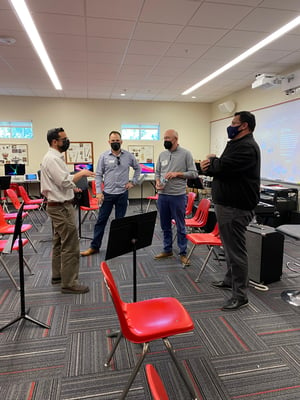I have spent more than half my life--all the way through graduate school--mastering the art of playing the clarinet. I am good enough to get paid to play clarinet in professional settings, even though I know I have a long way to go to compete with clarinetists like Benny Goodman or Richard Stoltzman.
Mastering an artistic skill, rather than simply dabbling in the arts, is invaluable. Creating art and music is so much more satisfying once we are confident, and confidence comes only when we develop mastery. It takes time, commitment and focus to master an artistic skill, and by doing so we open up the opportunity to share our joy of art making with others, to connect with people on a deeper level and potentially lead more satisfying lives. The skills I have developed, for instance, give me the opportunity to enjoy making music with other musicians, and share my joy and love for music with my students.
But does everyone have the ability to master the arts?
Many educational institutions favor arts “exposure and exploration” over in-depth learning experience and practice. The belief that only creative or innately talented students can develop an artistic skill leaves the majority of students to generalized “arts appreciation” experiences.
Arts education often becomes the fun, creative, elective class meant for dabbling. Students are encouraged by their mentors and families to “try everything!” But is there enough time for students to “try everything” and develop the confidence essential to fully enjoying an art form?
Consider athletics. Parents don’t spend hours driving to and attending their child’s soccer games or swim meets just to gain an overall appreciation of sports. They tend to encourage their child to stay in one sport s/he is passionate about to develop skills and confidence so s/he can eventually join varsity or a competitive club team. Such mastery of a sport makes the whole experience more meaningful (and often more fun!). The same should be true for students taking arts classes.
As with athletics, diligence, practice and hard work play just as important a role in the development of artistic skills as innate talent.
When I start my Sixth Grade Band class each semester, I usually have a few students who play piano very well. A couple of them have been playing since they were five years old, performing Chopin and Bach etudes with great beauty and ease. The assumption by newer piano students is that these students are extremely talented, gifted people.
The truth is, although they are talented and gifted--and they most definitely are--the reason they play so well is because they have been taking private lessons for many years and most likely practice every day. They are no different than the famous artists many students put on a pedestal, whose success seems so far out of reach. The more experienced pianists have been given an incredible opportunity to gain an artistic skill that will provide them with the joy of music-making for the rest of their lives.
But not everyone needs to become a wildly successful or professional artist. What of the amateur violinists who have mastered their art but don’t join a symphony? What value does s/he add to our culture? Aside from having music be an active part of their lives, they also play an important role as knowing observers, audience members and patrons who have experience to draw upon at artistic and musical events, allowing for deeper appreciation. I recently started learning to play the guitar with students in my Upper School Guitar class. It has been a good (and humbling) exercise for me as a teacher, and I’m thrilled to be learning a new artistic skill. We have learned quite a few chords together, and the students don’t ever miss an opportunity to correct me when I make a mistake! Often, we make mistakes together, and my respect for the process and journey of mastery is renewed.
I recently started learning to play the guitar with students in my Upper School Guitar class. It has been a good (and humbling) exercise for me as a teacher, and I’m thrilled to be learning a new artistic skill. We have learned quite a few chords together, and the students don’t ever miss an opportunity to correct me when I make a mistake! Often, we make mistakes together, and my respect for the process and journey of mastery is renewed.
Learning a new skill in a world that struggles to value learning for the sake of learning is a challenge. But taking the time required to master a skill like playing a musical instrument can help us--at any age--to tap into the potential we each have to express ourselves creatively . . . and to share the joy of music-making with friends and family.